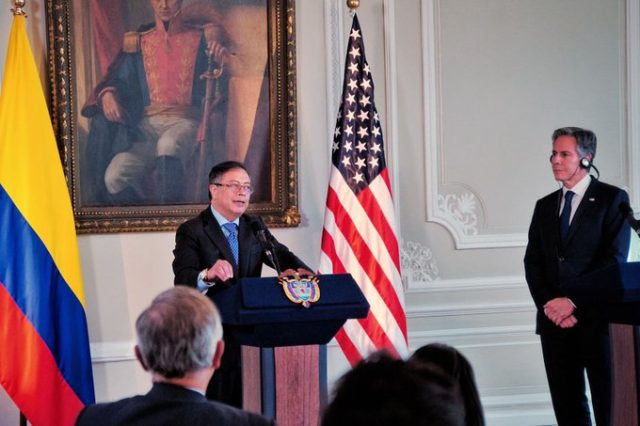The President of Colombia, Gustavo Petro, received the US Secretary of State, Antony Blinken, on Monday afternoon at the Casa de Nariño, seat of the Colombian Government in Bogotá, the capital of the South American country.
Among the issues addressed during the meeting, which lasted several hours and in which the Vice President, Francia Márquez, and the Foreign Minister, Álvaro Leyva, were also present, was the fight against drugs, which from the point of view of the Colombian Government has to be directed, mainly, to «persecute the owners of the drug trafficking business».
The Colombian president pointed out that in order to find the real culprits in the drug business, «capable intelligence devices» must be put in place to find the drug ‘lords’, whose only function «is to make money».
Petro commented that this time they addressed the issue of the fight against drugs, an issue that has been part of the agenda of both countries for decades, «from a more flexible perspective» and that has to do with «a more comprehensive vision of the drug consumption and production problem».
In that sense, he pointed out that one of the issues that can help change the situation of drug production in Colombia is the agrarian reform proposed by his Government which seeks to democratizefor access to land for the peasants and promote a crop substitution campaign.
To do this – Petro said – the anti-drug policy must «stop seeing the coca leaf producer as a criminal». “These are two points of the peace process, which at the time were also discussed with the US government and the government of (Juan Manuel) Santos, is what today we want to put into full force. Peace today affects, in my opinion, in a positive way, a new way of understanding the fight against drugs».»Repress and attack» the «true capital of drug trafficking»
The Colombian president, who added that in the conversation with Blinken they also talked about migration and the security of the Americas, pointed out that among the concrete aspects so as to hit the drug bosses, is to be able to «repress and attack» where «the true capital of drug trafficking» develops its business.
On this, Petro explained that in Colombia the world of drugs can be divided into two structures, one that he called «the drug trafficking proletariat», made up of people with limited resources who live in excluded areas and in conditions of vulnerability, who are put, «some with arms, and others sometimes with their crops» at the service of this illegal business.
In this structure, which is the lowest in drug trafficking, it is where «a good part of the violence» that Colombia suffers, takes place. And it is this violence that leaves «most of the (lethal) victims», as well as displacement and other violations of Human Rights.
On the other hand – he indicated – there is «the capital of drug trafficking,» which Petro pointed out as «the real owners» of a business that is made up of people who surely «do not dress in camouflage», who «perhaps do not carry a rifle», and that possibly «have been in these halls of the Palace of Nariño, as they have been in the whole of the Political Power of Colombia and perhaps today in other political powers outside of Colombia».“In tune” with Colombia
Blinken, for his part, described the meeting with Petro, Márquez and Foreign Minister Leyva as «good», and said that it served «to deepen» the «cooperation in the defense of democracy and human rights, the promotion of action climate change, supporting sustainable and inclusive peace and reconciliation, and addressing irregular migration».
In addition, he stressed that Washington has had «many interactions» with the Petro government and pointed out that in recent months they have been «learning from each other», in a process that has led them to have «similarities and shared elements in many of the issues» that they must address to improve the lives of their peoples, in an «inclusive» way.
Regarding the fight against drug trafficking, Blinken indicated: «We strongly support the holistic approach that President Petro is adopting through justice, development, environmental protection, to reduce the supply and also the demand» of drugs.
Blinken also indicated that the United States has also taken into account President Petro’s ideas regarding «doing more» to intervene in drug trafficking in its highest levels (bosses), an issue that Washington assured is «in tune» with the vision of Colombia.
Blinken arrived in Colombia around 1:00 in the afternoon and was received by the Vice Foreign Minister, Francisco Javier Coy, at the Colombian Air Force Military Transport Air Command base. The US official will be in Colombian territory until Tuesday, to then continue his tour of Chile and Peru.
According to a statement from the State Department, Blinken’s visit to Colombia is aimed at addressing the «shared priorities of supporting strong democratic governments and respect for human rights throughout the Western Hemisphere». He will also address «the climate crisis» as well as health and safety issues.
On the other hand, there is the implementation of «a holistic approach to counter drug trafficking and address its impacts»; and the US collaboration with the South American country to implement «more fully» the peace agreement signed in 2016 between the Colombian government and the former Revolutionary Armed Forces of Colombia (FARC).
There are also regional efforts to address irregular migration, as well as US support for the Colombian policy of Temporary Protection Status for Venezuelan Migrants, which he considers «a model for the region».


